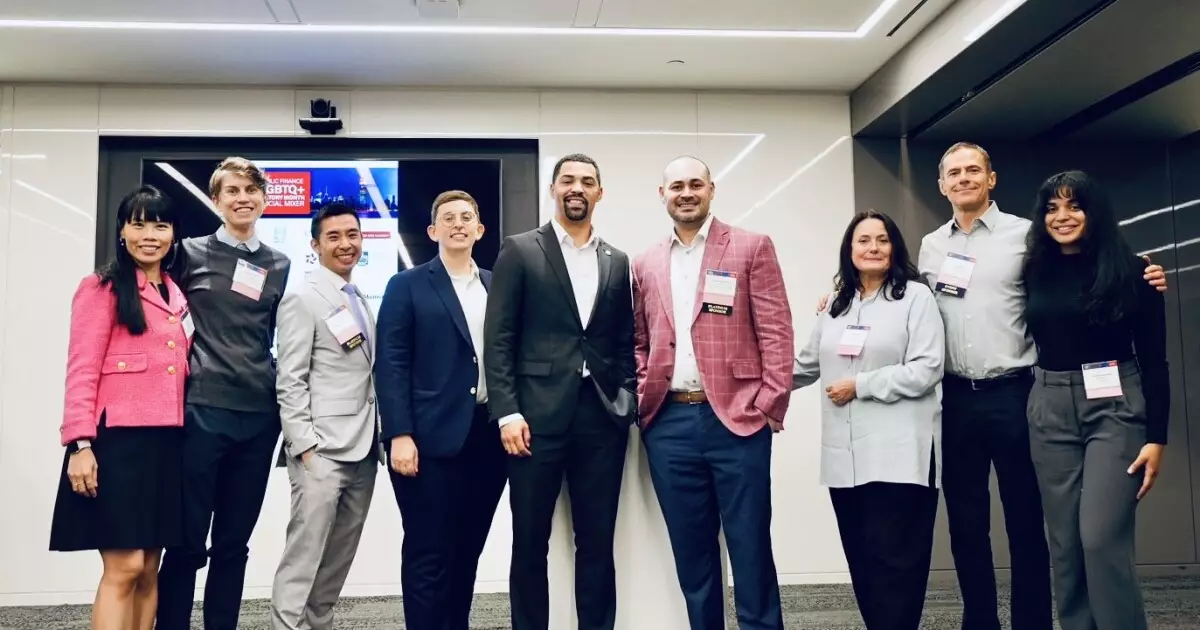The Legacy of Trailblazers: Celebrating LGBTQ+ History and Diversity in Public Service

At the recent Muni Pride LGBTQ+ History Month Social Mixer in Manhattan, Connecticut Treasurer Erick Russell delivered a powerful keynote address that resonated with themes of legacy, representation, and the importance of diversity in public service. As the first openly gay Black individual elected to statewide office in the United States, Russell stands as a beacon of progress and possibility. His speech not only celebrated the accomplishments of those who have paved the way for greater inclusion but also acknowledged the weight of responsibility that accompanies such groundbreaking achievements.
Russell emphasized that each person in the room stood on the “shoulders of those who came before us,” acknowledging the sacrifices made by previous pioneers in finance, law, and government. This idea of building upon the past is essential, especially in environments that have not traditionally supported diversity and representation. The essence of Russell’s message is that while accomplishments are to be celebrated, the ongoing struggle for equity and representation is far from over. Moving forward, future generations will look to today’s torchbearers, reinforcing the cyclical nature of advocacy and inspiration.
Erick Russell’s personal journey is a testament to the transformative power of representation. Growing up in New Haven, he faced numerous challenges but also found inspiration in the figure of Mike Lawlor, an openly gay state representative who served as Russell’s law professor. This experience was pivotal for Russell, fostering a realization that one could achieve respect and influence while living authentically. The profound effect of role models—especially in fields like law and public finance—cannot be understated; they shape the aspirations and realities of those who follow.
Russell’s early work in his family’s convenience store also revealed the foundations of hard work and determination. As he moved onward to become a summer associate at a prestigious law firm, coming out to his colleagues became a crucial step. Russell’s initiative to be authentic in his workplace, where he would invest countless hours, illustrates the importance of creating environments where all individuals can thrive without fear of judgment.
Taking on the role of the first openly LGBTQ+ Black elected official in the United States has not been without its pressures, as Russell candidly expressed. The scrutiny he faces as a trailblazer is a double-edged sword; it brings visibility to the community yet amplifies the stakes of failure. Yet, with this heightened attention comes the opportunity to effect change in profound and meaningful ways. Russell’s leadership extends beyond mere representation; it speaks to the importance of tangible policies that promote social justice.
One example that Russell highlighted is Connecticut’s Baby Bonds program, which provides savings accounts for children born into poverty. This initiative reflects a commitment to tackling the systemic issues that perpetuate inequality and is a direct response to the needs of the communities he represents. His remark, “It’s not just checking a box,” reinforces the idea that genuine inclusivity must be rooted in actionable change rather than superficial gestures.
The event itself, organized in partnership with Muni Pride, Northeast Women in Public Finance, and Norton Rose Fulbright, underscores the significance of collaboration across diverse groups. Alice Cheng, co-president of Northeast Women in Public Finance, remarked on the necessity of supporting inclusive initiatives in a time when diversity, equity, and inclusion (DEI) have become politicized topics. The commitment from various organizations to unite under a common goal emphasizes that diversity in leadership must be fostered intentionally.
With over 100 attendees registered for the event, the mixer demonstrated a robust interest in fostering a community where diverse voices can be amplified. As co-founder Alexander Vaisman noted, Muni Pride has successfully grown its membership, further proving the relevance of these inclusive efforts. The success of such networking events highlights the importance of community-building within public finance that values and respects every individual’s contributions.
As Connecticut gears up for a significant bond deal, the positive fiscal health of the state is a promising indicator of progress. Russell’s remarks about maintaining balanced budgets and reducing unfunded liabilities position Connecticut as an attractive place to invest, but they also mirror the larger narrative of the LGBTQ+ community’s ongoing fight for equity.
In echoing the rich history of movements like Stonewall, Russell reminded attendees that the road to equality is fraught with challenges and requires perseverance and vigilance. The spirit of pride started as a riot, and it serves as a powerful reminder that the quest for true representation and justice is an ever-evolving struggle. In celebrating LGBTQ+ History Month, events such as this are not merely reflective; they are actionable. They pave the way for a more inclusive, equitable future where diverse leaders can continue to inspire and effect meaningful change in their communities.





